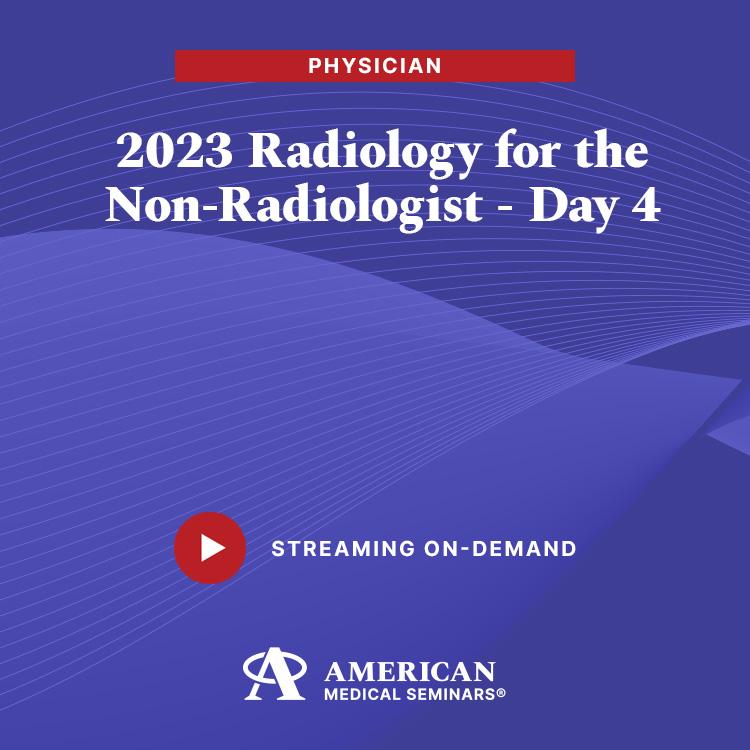Title:2023 2023 Radiology for the Non-Radiologist – Day 4 (Physician)
Faculty: Adam R. Guttentag, M.D.; Ryan K. Lee, M.D., MBA.; and Ryan Smith, M.D.
Release Date: 7/1/2023 Expiration Date: 7/1/2026
Day 4
Non-Invasive Vascular Imaging: Aorta, Carotids, and More
Upon completion of this session, the participant should be able to: EBM, COMP
- Design an evidence-based algorithm for integrating imaging into the evaluation of patients with suspected carotid stenosis.
- Select appropriate tests to order for patients with suspected acute aortic syndromes.
- Integrate modern non-invasive techniques into the evaluation of suspected visceral and peripheral artery disease.
Evaluation of Patients with Suspected Pulmonary Embolism
Upon completion of this session, the participant should be able to: EBM, COMP
- Develop an evidence-based algorithm for the use of imaging in the evaluation of patients with possible thromboembolic disease.
- Discuss the advantages and disadvantages of various imaging techniques in PE evaluation.
- Integrate d-Dimer testing into the evaluation of patients with suspected pulmonary embolism when appropriate.
Back Pain Imaging
Upon completion of this session, the participant should be able to: EBM, COMP
- Use evidence-based guidelines to help decide which patients require immediate imaging for evaluation of back pain.
- Discuss the utility of various forms of imaging for specific lumbar pathologies.
- Analyze a radiologist’s report of lumbar imaging with respect to the patient’s specific symptoms.
Evaluation of Hematuria and Flank Pain
Upon completion of this session, the participant should be able to: GL, COMP
- Determine which studies are most appropriate in evaluating flank pain, utilizing the American College of Radiology Appropriateness Criteria.
- Determine which studies are most appropriate, in evaluating hematuria, using the American College of Radiology Appropriateness Criteria.
- Detect abnormalities on ultrasound and computed tomography in patients with flank pain and/or hematuria.
Female Pelvic Imaging
Upon completion of this session, the participant should be able to: GL, COMP
- Order appropriate radiologic studies for evaluating patients with dysfunctional uterine bleeding, according to the American College of Radiology Appropriateness Criteria.
- Utilize the most appropriate imaging studies for evaluating female patients with pelvic pain, according to the American College of Radiology Appropriateness Criteria.
- Determine which studies are most appropriate for evaluating patients with post-menopausal bleeding using the American College of Radiology Appropriateness Criteria.
- The receipt for any incentive-associated purchase will designate the value of the gift card separately from the cost of the learning activity.
- This incentive may have implications on your tax reporting obligations. Any reimbursed amount must be declared as personal income for tax purposes.

